CONTACTStaffCAREER OPPORTUNITIESADVERTISE WITH USPRIVACY POLICYPRIVACY PREFERENCESTERMS OF USELEGAL NOTICE
© 2024 Pride Publishing Inc.
All Rights reserved
All Rights reserved
Scroll To Top
By continuing to use our site, you agree to our Private Policy and Terms of Use.
With stateside pop culture gluttons all aflutter in recent weeks over who might be crowned the next American Idol, much of the rest of the west-leaning world had its eyes and ears keenly trained on an entirely different crooning competition, one pitting nation against nation, one with historic international import on a level Idol can only dream of, and one trumping it by a landslide for sheer gay spectacle.
If youve never heard of the Eurovision Song Contest, youve certainly heard its byproducts. In its wild and wacky 51-year history since being conceived as a one-off by the European Broadcasting Union, Eurovision has given the world the superstar likes of ABBA (who made their debut on the world stage representing Sweden in 1974 with Waterloo, besting Olivia Newton-John, the United Kingdoms entry that year) and Celine Dion (who won in 1988 as Switzerlands candidate). Along the way, Lulu, Cliff Richard, Julio Iglesias, and even Katrina & the Waves have competed, and a host of Eurocentric gay icons have been createdall to the shocking ignorance of poofsters (much less anyone else) this side of the pond.
Eurovision is like the Oscars for gay Europeans, says Peter Andersen, a.k.a. DQ, Denmarks entry this year. Andersen performed a song called Drama Queen and was one of a record two competitors in drag. Its the glamour, its the excitement. Theres nothing like it. Weve all been watching it and loving it since we were young, so now when the night comes, everyone gets together with their friends and their popcorn and groups around the TV to see what will happen.
What happened this year was especially queerific, even for a competition with longstanding gay undertones: Serbias Marija Serifovic became the first lesbian to win Eurovision with her impassioned and soaring Sapphic ballad Molitva (Prayer), the first non-English-language champ since 1998. First runner-up was Ukraines Verka Serduchka, a sort of electro drag act, rapping and singing the infectious Dancing (Lasha Tumbai). Other rainbow-friendly acts for 2007 included Swedish modsters the Ark, whose flamboyant bisexual lead singer, Ola Salo, belted The Worrying Kind; Austrias Eric Papilaya, who emerged from a massive ostrich-feathered AIDS ribbon sporting crystal-encrusted Vivienne Westwood to perform his song Get a Life, Get Alive; and the United Kingdoms camp band Scooch, who despite digging out a host of previous Eurovision tricks (airline host/ess uniforms, sexual innuendo, and melodic allusions to a delightedly united Europe) barely escaped last place with Flying the Flag, a gay debacle so over the top that the Finnish TV commentator (apparently on purpose) introduced it as Flying the Fag before correcting herself.
As neatly as something so nutty can be nutshelled, the Eurovision game goes like this: Early every year, each of the 42 competing countries elects a representative, usually through a series of countrywide semifinals and finals. In May, under the watchful eyes of over 100 million viewers, the national reps come together in the country that took the previous years Eurovision crown to battle it out with one three-minute song each. If a country was in last years top 10, its contestant goes directly to the finals. Likewise (through a longstanding but increasingly grumble-inducing rule) contestants from England, France, Germany, and Spain are automatically finalists. Everyone else dukes it out in a semifinal for the 10 remaining slots in the all-important final competition. Voting is done via phone by the European public in a brief 15-minute window immediately following the competition, wherein viewers can vote for anyone outside their own country. (They tend to vote for the contestant from the neighboring country that has historically invaded them the least.)
Along the way, several scandals are sure to surface, which may partly explain Eurovisions gay draw. Last year proved especially scandalous, beginning with the implosion of an early favorite, Icelands tongue-in-cheek pop princess Silvia Night, at the hands of the Greek press (Ungrateful bastards! a tearful Night deliciously lamented to reporters after the outcome. You dont vote for me because Im not a slut from Holland, and Im not an ugly fucking old bitch from Sweden!), and culminating in the shocking win of Finnish monster rockers Lordi, who, upon winning the Finn final, appalled some of their own countrymen so much that calls went out for president Tarja Halonen to disqualify them outright.
Sure, Paula Abdul can break her nose tripping over her Chihuahua on the eve of the American Idol finals, but thats kid stuff. Imagine a world in which Melinda Doolittle calls Jordin Sparks a slut from Arizona (on camera no less), or one where a disgruntled American public demands that Bush ban Sanjaya. This is Eurovision, where pop and politics can and do sometimes mixand despite a high camp factor, it speaks to how seriously Europeans take the competition.
Nowhere is this more evident than in the still-emerging east, where Eurovisions focus has shifted in recent years. 2004 winner Ruslana became a poster child for that years Orange Revolution in her native Ukraine, while the same countrys aforementioned number two, Serduchka, sparked controversy this year with the repeated lyrics I want to seelasha tumbai. The singer claimed the last two words were Mongolian for churned butter; however, outraged citizens of the big bear to Ukraines east remained unconvinced, believing the lyrics were I want to seeRussia goodbye. Likewise, Israels controversial war drumbeating entry, Push the Button, from the group Teapacks, ruffled Iranian feathers this year. (The groups failure to make any churned butter clarifications may explain the boos and lack of points it received in the semifinals.)
Even unwitting 22-year-old winner Serifovic became a topic of parliamentary debate in her native Serbia almost as soon as she returned home, with various political factions vigorously claiming her support. No shrinking violet, Serifovic shot them all down. I am politically neutral, and I intend to stay that way, she told legislators. I keep my hands off politics, and I expect the politicians to keep theirs off my music. You go, girl.
As for her sexuality, Serifovic has reportedly been out since 2004. In previous public appearances she usually let stylists femme her up, but the Eurovision final in Helsinkiwhere she sported a tousled dyke do and dapper Dolce & Gabbana dudsmarked her unabashedly butch stage debut. For now shes refusing to comment on her personal life, but with a winning performance (called a slow motion lesbian porn flick by a BBC personality), during which she ambled among five beautiful backup singers (each with half-hearts drawn on their hands meant to become full when brought together with anothers), the message was clear.
Gay rumors are nothing new to Eurovision and have actually plagued its only two-time winner, Irelands Johnny Logan, for years. While the contest has seen several openly gay competitors (especially in the years since 1998, when Israels Dana International exploded the pink ceiling by not only becoming Eurovisions first transsexual entrant, but by actually taking top honors with Viva La Diva), homo-hesitancy is understandable for contestants from countries where being gay is still tantamount to criminality. Dont ask, dont tell has become the unspoken rule among the media, for its understood that even a tight-lipped queer contestant could, if successful, actually further the cause of gay rights under an oppressive regime. By bringing the Eurovision final to Belgrade next year, Serifovics win will shed much-needed positive light not only on Serbia, but also its nascent gay community.
In the lead-up week to every Eurovision final, gays from across Europe descend upon the host city, turning the hometown homo scene into an instant international free-for-all. This year in Helsinki was no exception, as the citys two largest queer clubs, DTM and Hercules, overflowed into the streets with Euro-wide delegation members and fans, while DJs furiously spunwhat else?Eurovision glory, past and present. An even more formidable Finn queue formed before Con Hombres, which has coined itself The Eurovisionbar, playing nonstop Eurovision hits. To be obliviously American in a club where the queens of many nations go crazy every three minutes at the first notes of random Eurovision gems is an indescribably surreal experience.
With tickets to the actual final this year available only as part of an exorbitantly priced package (390 Euros, or well over $500), some of Helsinkis homo elite opted to shell out a far more reasonable 40 Euros (about 55 bucks) apiece to watch the festivities live from the trendy Gayrovision party, held in a sleek rented theater-cum-bar-cum-sauna-space downtown. The natives naturally crooned along and cheered wildly for local gal Hanna (Finlands entry this year with Leave Me Alone) and danced about to Serduchka, but were clearly riveted by Serifovics moving vocals. For most Europeans to even think of voting for a Serb at this point, shed have to be pretty amazing, said one partygoer as the vote tally rolled in. And she was pretty amazing.
Eurovision fever will break for a few months now until the ramp-up to Belgrade begins around the first of next year, but the fervor never fully fades. Meanwhile, plans to produce an American version of Eurovision, an annual sing-off of reps from each of the 50 states announced by NBC in early 2006, seem to have stalled. No, no, no, no, reacted one U.K. blogger to the concept at the time. This just won't work. A Song for the States will simply not be able to capture the magic of Eurovision. The thing that makes Eurovision work is the car crash of European cultures, musical styles, bizarre lyrics, languages, costumes, foreign locales, political voting, and downright weird performancesall wrapped up in a pan-European bitchy huddle.
From our Sponsors
Most Popular
41 male celebs who did full frontal scenes
September 16 2024 2:02 PM
39 LGBTQ+ celebs you can follow on OnlyFans
November 19 2024 9:39 AM
33 actors who showed bare ass in movies & TV shows
September 17 2024 5:43 PM
26 LGBTQ+ reality dating shows & where to watch them
December 10 2024 12:38 PM
21 times male celebrities had to come out as straight
November 19 2024 3:33 PM
17 queens who quit or retired from drag after 'RuPaul's Drag Race'
November 30 2024 12:26 AM
52 steamy celebrity Calvin Klein ads we'll always be thirsty for
August 27 2024 1:08 PM
15 things only bottoms understand
October 08 2024 5:18 PM
15 gay celebrity couples who make us believe in love
October 03 2024 5:43 PM
A gay adult film star's complete guide to bottoming
September 16 2024 8:50 AM
Latest Stories
Out100 Special honors 30 years of LGBTQ+ brilliance
December 23 2024 11:40 AM
Trixie Mattel just spilled some hot tea on that cringe Zach Sang interview
December 23 2024 10:55 AM
Netflix to stream Women's World Cup—these queer soccer players paved the way
December 21 2024 12:00 PM
Celebrating extraordinary leaders of the Out100 Special
December 21 2024 9:00 AM
Ranking the top 10 albums released by LGBTQ+ artists in 2024
December 20 2024 7:20 PM
Frotting vs. Frottage: Here are the key differences you should know
December 20 2024 6:50 PM
What's your battle cry? The 'Wicked' sing-along album is finally here
December 20 2024 6:15 PM
What is T-Boy Wrestling? Learn more about this sport for trans men
December 20 2024 3:48 PM
Where and how to watch the 2024 Out100 Special
December 20 2024 3:37 PM
Out and About with Billy Eichner
December 20 2024 3:28 PM



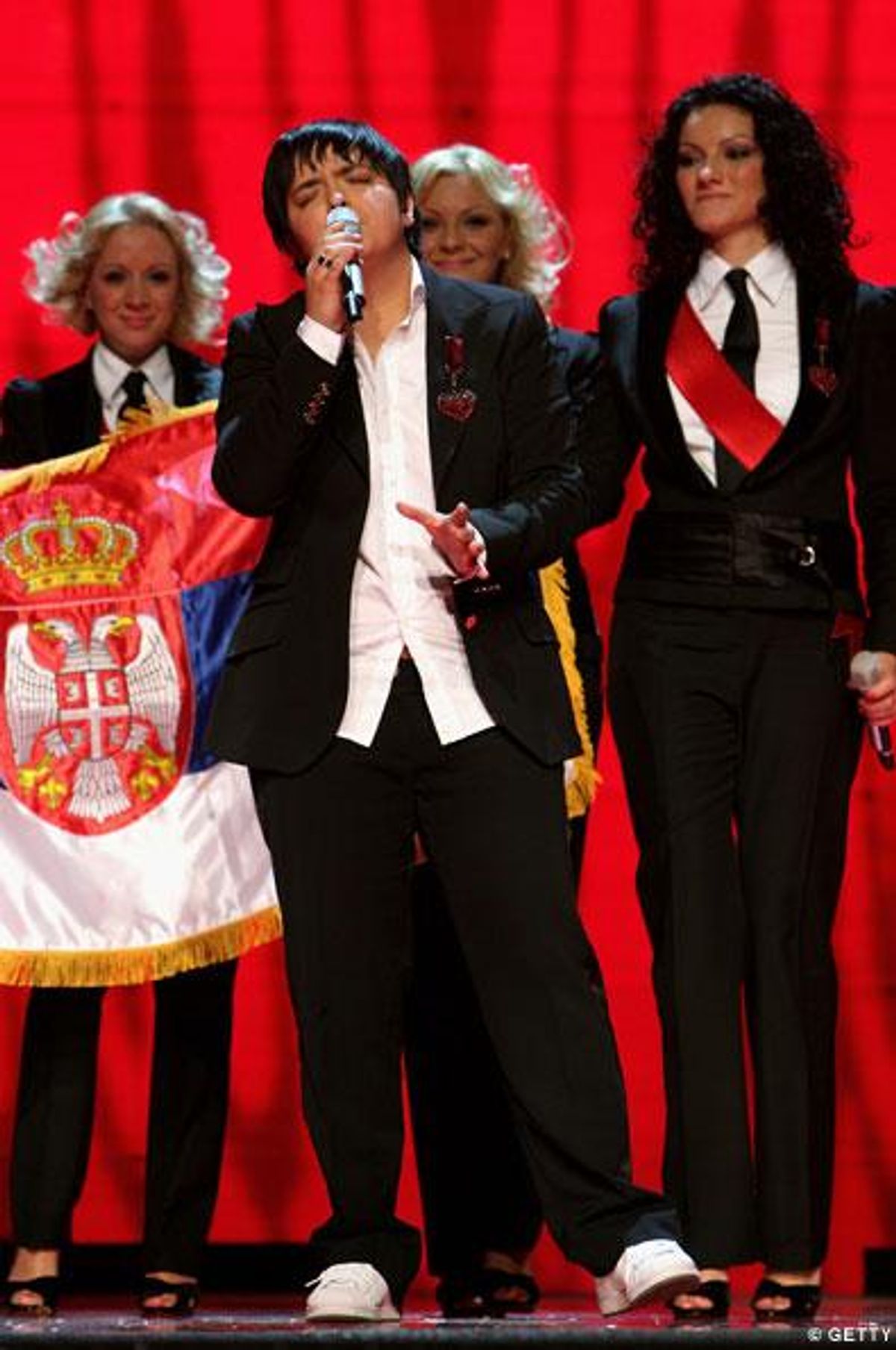





































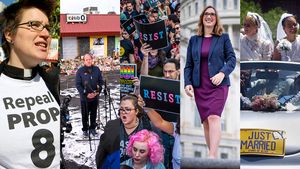
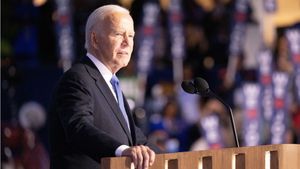

































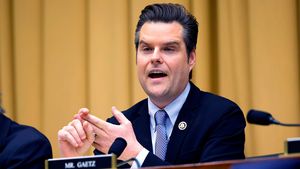



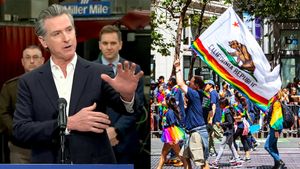

Sexy MAGA: Viral post saying Republicans 'have two daddies now' gets a rise from the right